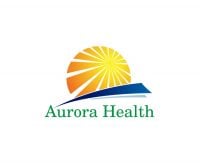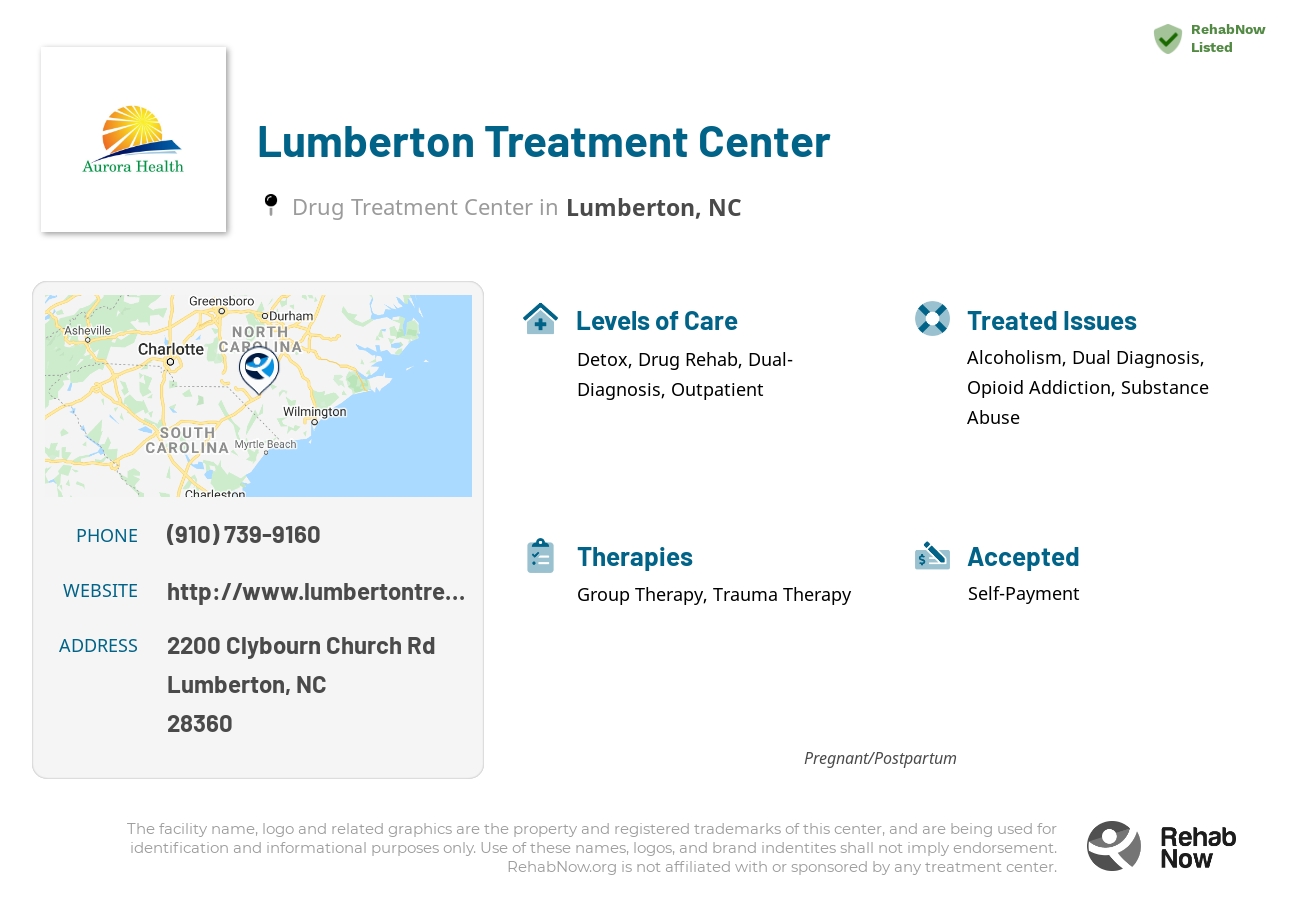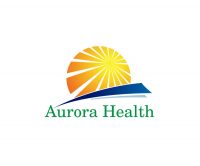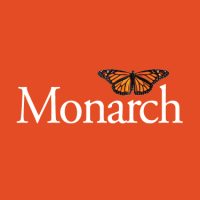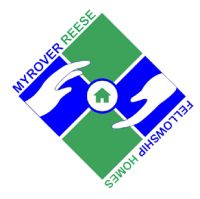Lumberton Treatment Center
Drug Rehab Center in Lumberton, North Carolina
The Lumberton Treatment Center provides drug rehab services to individuals struggling with addiction and substance abuse issues, offering detoxification, counseling, therapy and aftercare to successfully treat a variety of addictions. Their team of experienced experts ensures quality care that is accredited by SAMHSA, helping people achieve long-term sobriety.
About This North Carolina Facility
Lumberton Treatment Center, located in Lumberton, North Carolina, is committed to the rehabilitation of adults battling with heroin and opioid addiction, as well as alcoholism, drug addiction, and dual diagnosis. Renowned for its specialized focus on opioid addiction and a part of an extensive network of private rehab clinics across NC, the center tailors its approach to meet the unique needs of each individual seeking sobriety.
Accredited by the Substance Abuse and Mental Health Services Administration (SAMHSA), Lumberton Treatment Center stands out for its comprehensive addiction treatment services. Its dedication to providing high-quality care encompasses a wide range of treatment options, including alcoholism, drug addiction, opioid addiction, substance abuse, and dual diagnosis treatment.
- Specialized Opioid Addiction Treatment: Offering a focused approach to battling heroin and opioid addiction.
- Dual Diagnosis Care: Tailored programs for individuals dealing with co-occurring mental health disorders and substance abuse.
- Accredited, High-Quality Care: Recognized by SAMHSA, ensuring adherence to the highest standards in addiction treatment.
Focusing on a range of specific addictions such as alcoholism, drug addiction, and particularly opioid addiction, the Lumberton Treatment Center provides various treatment methods. These include detoxification, drug rehab, dual-diagnosis treatment, outpatient programs, and aftercare support, all designed to support individuals at every stage of their journey towards recovery.
Genders
Ages
Modality
Additional
Accreditations
SAMHSA
Conditions and Issues Treated
Substance abuse typically leads to addiction, which requires specialized treatment programs at Lumberton Treatment Center to address. Many people benefit from inpatient drug rehabilitation, which includes inpatient acute care and residential rehabilitation. Other levels of care include intensive outpatient therapy, individual counseling, and support groups. Family therapy is also an essential part of treatment for substance abuse.
A combination of treatments is often needed to treat drug abuse issues effectively. In the case of drug abuse, there is no easy answer or one-size-fits-all cure.
Opioid addiction treatment helps people addicted to opioids in North Carolina curb their drug use. The selection of a treatment setting depends on the severity of the addiction. Mild cases are usually treated in outpatient facilities; severe cases need hospitalization or treatment in a residential facility. Doctors use medicines along with counseling and behavioral therapies to treat the addiction. The treatment includes medication, counseling and therapy. It can also include group counseling, individual counseling and family counseling.
People with dual diagnosis have coexisting addiction and a mental disorder. 9.2 million US adults had a co-occurring disorder in 2018, so not just limited to North Carolina residents. Best treatment combines medication, psychotherapy (talk therapy), support group, and inpatient rehabilitation. Sometimes, complementary therapies – yoga, massage, and acupuncture – may also be used.
Levels of Care Offered at Lumberton Treatment Center
This center offers a variety of custom treatment tailored to individual recovery. Currently available are Aftercare Support, Detox, Drug Rehab, Dual-Diagnosis, Outpatient, with additional therapies available as listed below.
Detox is the stage of recovery where the drugs or alcohol are entirely removed from your body. There are two different ways to detox, with medications and without. For many drugs and alcohol, the acute phase of detox can be completed in a number of days.
Outpatient treatment plans cover diagnosis, detoxification, management, and counseling. They are a popular option for those who have graduated from inpatient facilities. Services in North Carolina include medication-assisted treatment (MAT) and individual and group therapy.
After treatment, addiction treatment can be frightening for newly sober people. Aftercare support provided by Lumberton Treatment Center is designed to give resources and help on a continued basis. It can involve finding housing in and around North Carolina, setting up 12-step meeting groups, continued medical monitoring, and counseling.
Therapies & Programs
Couples therapy aims to rebuild the trust between the partners. Partner’s involvement in the process will result in greater chances of treatment success. Couples therapy addresses financial issues, loss of trust, lack of intimacy, and physical abuse.
Family therapy is a set of therapeutic approaches that assumes that the entire family is a system. It utilizes the strengths and resources of the family to help the patient refrain from resorting to substance abuse. The impact of substance abuse is not just on the patient but on the entire family. Family therapy ensures that the patient gets adequate support from the family members after the treatment making the recovery process sustainable
- Family therapy guides all the members of the family to help the patient.
- It helps to repair relationships and improve communication between family members.
- It helps to keep the patient engaged and motivated throughout the treatment.
Group therapy is an important tool in recovery. Finding a peer group in Lumberton, NC and others who relate to your situation is a fundamental tool for recovery at Lumberton Treatment Center. Addiction tends to lead to isolation and feelings of uniqueness. The accountability and friendship that is found in group therapy can be more effective than any single other treatment approach. This is generally introduced early in recovery and is recommended as a lifetime treatment habit.
Trauma therapy is a way of addressing trauma while in a safe situation in order to heal. This may involve Lumberton Treatment Center managing individual or group counseling or both. Other forms of therapy have been proven to assist in healing past traumas.
A type of cognitive-behavioral therapy is Dialectical Behavioral Therapy. It is intended for those who are vulnerable to self-harm and suicidal thoughts. Lumberton Treatment Center aims to help patients understand the connection between their feelings, emotions, and behaviors and provide them with the tools to make a difference in Lumberton, NC. For those whose addictions and habits originate from severe mental health problems, it is beneficial.
Negative feelings are common in substance abuse disorders. If not recognized, they can cause co-occurring disorders. CBT involves strategies that help to change the thinking and behavioral pattern. It can be administered as a monotherapy as well as a part of combination therapy.
Rational Emotive Behavioral Therapy (REBT) is a variation of Cognitive Behavioral Therapy (CBT) that helps people understand how maladaptive, negative, and habitual thoughts and feelings lead to bad life choices. REBT is based on the idea that people operate under many irrational but habitual patterns of thought that fuel harmful practices.
The first three steps depend on the patient, so they are more specific and situational. The succeeding four steps center on practical issues brought on by substance abuse. Steps 8 and 9 deal with the social and emotional repercussions of addiction, encouraging patients to make amends to people they have wronged. These are followed by two steps revolving around the further exploration and reinforcement of Steps 1 to 9.
The last step requires an individual to extend a helping hand to people who are still in the early stages of their recovery.
Payment Options Accepted
For specific insurance or payment methods please contact us.
Additional Details
Specifics, location, and helpful extra information.
Lumberton, North Carolina 28360 Phone Number(910) 739-9160 Meta DetailsUpdated April 15, 2024
Staff Verified
Patient Reviews
There are no reviews yet. Be the first one to write one.
Lumberton, North Carolina Addiction Information
North Carolina ranks 29th in the nation for overall substance abuse. Many of the drugs abused in the state are illicit, and many of these are opioids. Prescription opioids are readily available due to the high rates of medical workers prescribing them. The number of prescriptions has increased tenfold since the 1980's. Opioid overdoses are the most common type of death in North Carolina.
70% of high school teens engage in alcohol and drug use at Lumberton. 4.5% of people aged 12 or older were using illicit drugs in recent years. Common types of drugs abused in Lumberton are opioids, marijuana, and cocaine. Nearly 40 people are actively involved in cocaine trafficking. The time to fully recover from addiction depends on the severity of the addiction and the type of treatment addicts underwent when in recovery.
Treatment in Nearby Cities
- Waynesville, NC (231.4 mi.)
- Fairmont, NC (12.1 mi.)
- Davidson, NC (118.3 mi.)
- Browns Summit, NC (114.3 mi.)
- Castle Hayne, NC (67.7 mi.)
Centers near Lumberton Treatment Center
The facility name, logo and brand are the property and registered trademarks of Lumberton Treatment Center, and are being used for identification and informational purposes only. Use of these names, logos and brands shall not imply endorsement. RehabNow.org is not affiliated with or sponsored by Lumberton Treatment Center.
